中国寓言故事中英对照
中国寓言故事英文版
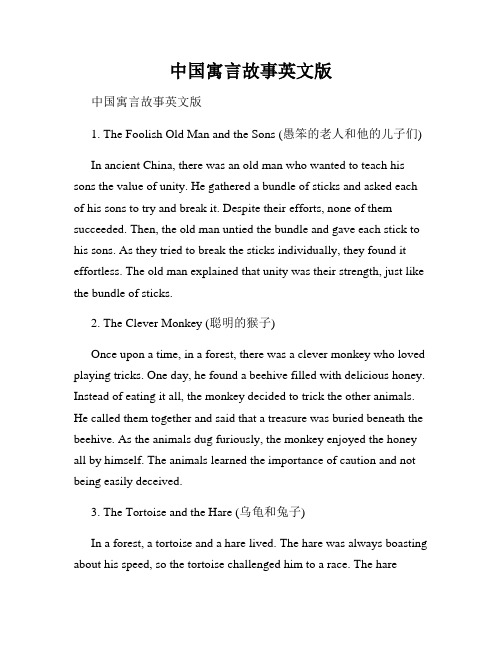
中国寓言故事英文版中国寓言故事英文版1. The Foolish Old Man and the Sons (愚笨的老人和他的儿子们)In ancient China, there was an old man who wanted to teach his sons the value of unity. He gathered a bundle of sticks and asked each of his sons to try and break it. Despite their efforts, none of them succeeded. Then, the old man untied the bundle and gave each stick to his sons. As they tried to break the sticks individually, they found it effortless. The old man explained that unity was their strength, just like the bundle of sticks.2. The Clever Monkey (聪明的猴子)Once upon a time, in a forest, there was a clever monkey who loved playing tricks. One day, he found a beehive filled with delicious honey. Instead of eating it all, the monkey decided to trick the other animals. He called them together and said that a treasure was buried beneath the beehive. As the animals dug furiously, the monkey enjoyed the honey all by himself. The animals learned the importance of caution and not being easily deceived.3. The Tortoise and the Hare (乌龟和兔子)In a forest, a tortoise and a hare lived. The hare was always boasting about his speed, so the tortoise challenged him to a race. The harelaughed, thinking victory was certain. He took a nap during the race, assuming he would easily win. Meanwhile, the tortoise continued at a slow and steady pace. When the hare woke up, he found the tortoise had already crossed the finish line. The tortoise taught the hare that perseverance and consistency are essential to success.4. The Greedy Farmer (贪婪的农夫)Once, there was a farmer who had a magic goose that laid golden eggs. The farmer became greedy and wanted to get all the golden eggs quickly. He thought there must be a lot of gold inside the goose. So he killed the goose, only to find that it was just like any other ordinary goose. The farmer lost the goose that laid the golden eggs, teaching him the lesson that greed leads to loss.5. The Fox and the Grapes (狐狸和葡萄)A hungry fox spotted a ripe bunch of grapes hanging from a vine. The fox tried to reach them but couldn't. He kept trying until tired. Finally, he gave up and said, "Those grapes must be sour and not worth eating." The fox made himself believe that the grapes were undesirable rather than admitting his failure. The moral of the story is that it is easy to despise what we cannot have.6. The Ant and the Grasshopper (蚂蚁和蝗虫)In a field, an ant worked hard to collect food for the winter. Meanwhile, a grasshopper played all day long. When winter arrived,the ant had enough food to survive, while the grasshopper had none. The ant learned the importance of hard work and planning for the future, while the grasshopper learned the consequences of laziness.7. The Fisherman and the Golden Fish (渔夫和金鱼)A fisherman caught a golden fish that turned out to be a magical creature. The fish pleaded to be released in return for granting any wish. The fisherman made extravagant wishes but was never satisfied. Finally, he realized his greed and asked the fish to return him to his humble life as a fisherman. The story teaches that contentment brings true happiness.8. The Dove and the Ant (鸽子和蚂蚁)A dove, flying over a river, noticed an ant struggling in the water. The dove plucked a leaf and dropped it next to the ant, saving its life. Later, the ant returned the favor by biting a hunter who was about to shoot the dove. The story highlights the importance of kindness and the idea that helping others will ultimately benefit oneself.9. The Boy Who Cried Wolf (撒谎的男孩)A mischievous boy lived in a village and often lied about a wolf threatening the flock. The villagers rushed to help him every time, only to discover he had tricked them. Eventually, when a real wolf appeared, the boy cried for help, but no one believed him. The moral is that repeated dishonesty will lead to a loss of trust and credibility.10. The Lion and the Mouse (狮子和老鼠)A mighty lion was caught in a hunter's net. A little mouse, moved by his cries, helped the lion by nibbling through the ropes to set him free. Later, when the lion fell into a trapper's trap, the mouse returned the favor and gnawed through the ropes. The story teaches that even the smallest of creatures can be of great help.These Chinese fables showcase important morals and life lessons that have been passed down through generations.。
中国寓言故事英文
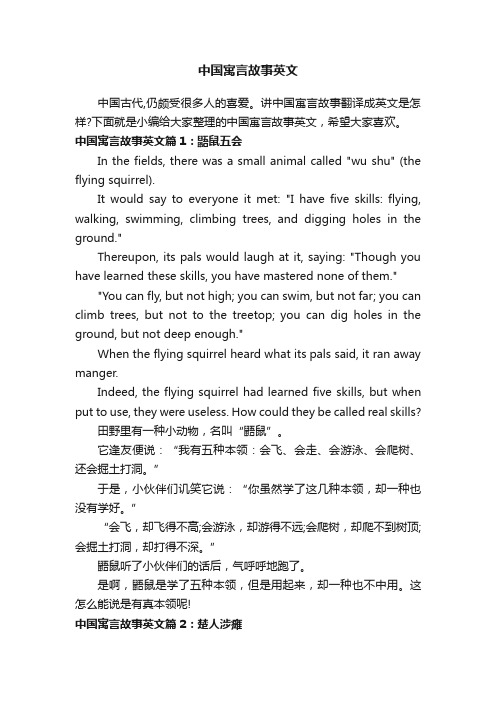
中国寓言故事英文中国古代,仍颇受很多人的喜爱。
讲中国寓言故事翻译成英文是怎样?下面就是小编给大家整理的中国寓言故事英文,希望大家喜欢。
中国寓言故事英文篇1:鼯鼠五会In the fields, there was a small animal called "wu shu" (the flying squirrel).It would say to everyone it met: "I have five skills: flying, walking, swimming, climbing trees, and digging holes in the ground."Thereupon, its pals would laugh at it, saying: "Though you have learned these skills, you have mastered none of them.""You can fly, but not high; you can swim, but not far; you can climb trees, but not to the treetop; you can dig holes in the ground, but not deep enough."When the flying squirrel heard what its pals said, it ran away manger.Indeed, the flying squirrel had learned five skills, but when put to use, they were useless. How could they be called real skills?田野里有一种小动物,名叫“鼯鼠”。
英文版的中国故事带翻译

英文版的中国故事带翻译01凿壁偷光Kuang Heng was born in a poor family. He liked reading books very much. He needed to work at daytime, so he had to read books during night. But he was too poor to buy a candle.One day, he found his neighbour had candles, but the light couldn’t go through his room. So he dug a small hole on the wall so that he could use the light to read books. From that day, he read books every night until the light went out.However, he finished reading all his books and there were no books for him to read. Then he went to a rich man’s house and worked for him without payment. The rich man asked: “Why don’t you want the money?”Kuang Heng said: “Because I only want to borrow your books.”The rich man agreed. Kuang Heng read the books one by one.Finally, he became a great scholar.匡衡勤奋好学,但家中没有蜡烛。
邻家有蜡烛,但光亮照不到他家,匡衡就在墙壁上凿了洞引来邻家的光亮,让光亮照在书上读书。
中国成语寓言故事中英双语

中国成语寓言故事中英双语想要学好英语,一定要懂得学习方法。
有趣的学习方法能让你的英语水平提升得更快,小编在此献上英语故事,希望对你有所帮助。
成语寓言故事:Taking a Stone for a Treasure视石为宝In ancient times, a man of the State of Song picked up a stone in Linzi. He examined it over and over and regarded it as a treasure. He quickly took it home, wrapped it up in dozens of silk layers, then put it in a leather box. But he still felt uneasy, so he covered the box with dozens of boxes.古代,宋国有个人在临淄拾到了一块石头。
他左看右看,认为这是一件宝贝,急忙拿回家去,用丝绢包了起来。
包了一层又一层,一连包了几十层,才把它放进皮匣子。
但是,他还不放心,在匣子外面又套上匣子,一连套了几十只。
When a man who could identify treasures heard of this, he went at once to this man and asked to have a look at the treasure.有个识宝的人,一听到这个消息,就马上到他那里,请求看一看这件宝贝。
To be prudent, this man of Song took a bath, burned incense, cleansed his mind, calmed his mood, and went in for self- cultivation for seven days. Then be put on ceremonial robes, respectfully took out the box, and carefully took the stone out of the box.那个宋国人,为了慎重起见,熏香沐浴,清心静气,修养了七天,然后穿上大礼服,恭恭敬敬地请出匣子,小心翼翼地把那块石头从匣子里取出来。
英译中国文化寓言故事
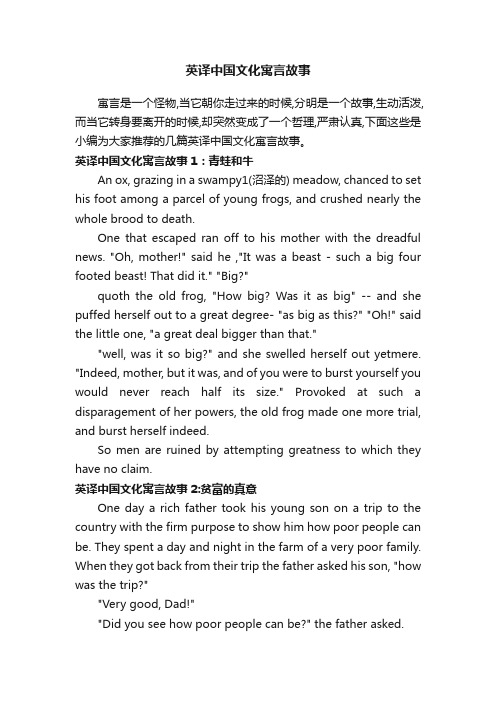
英译中国文化寓言故事寓言是一个怪物,当它朝你走过来的时候,分明是一个故事,生动活泼,而当它转身要离开的时候,却突然变成了一个哲理,严肃认真,下面这些是小编为大家推荐的几篇英译中国文化寓言故事。
英译中国文化寓言故事1:青蛙和牛An ox, grazing in a swampy1(沼泽的) meadow, chanced to set his foot among a parcel of young frogs, and crushed nearly the whole brood to death.One that escaped ran off to his mother with the dreadful news. "Oh, mother!" said he ,"It was a beast - such a big four footed beast! That did it." "Big?"quoth the old frog, "How big? Was it as big" -- and she puffed herself out to a great degree- "as big as this?" "Oh!" said the little one, "a great deal bigger than that.""well, was it so big?" and she swelled herself out yetmere. "Indeed, mother, but it was, and of you were to burst yourself you would never reach half its size." Provoked at such a disparagement of her powers, the old frog made one more trial, and burst herself indeed.So men are ruined by attempting greatness to which they have no claim.英译中国文化寓言故事2:贫富的真意One day a rich father took his young son on a trip to the country with the firm purpose to show him how poor people can be. They spent a day and night in the farm of a very poor family. When they got back from their trip the father asked his son, "how was the trip?""Very good, Dad!""Did you see how poor people can be?" the father asked."Yeah!" "And what did you learn?"The son answered, "I saw that we have a dog at home, and they have four. We have a pool that reaches to the middle of the garden; they have a creek(小溪) that has no end. We have imported lamps in the garden; they have the stars. Our patio(露台,天井) reaches to the front yard; they have a whole horizon."When the little boy was finishing, his father was speechless.His son added, "Thanks, dad, for showing me how poor we are!"Isn't it true that it all depends on the way you look at things? If you have love, friends, family, health, good humor and a positive attitude toward life, you've got everything!英译中国文化寓言故事3:牧童和狼A Shepherd-boy, who tended his flock not far from a village, used to amuse himself at times in crying out "Wolf! Wolf!" Twice or thrice his trick succeeded.The whole village came running out to his assistance when all the return they got was to be laughed at for their pains. At last one day the wolf came indeed.The boy cried out in earnest. But his neighbors, supposing him to be at his old sport, paid no heed to(不注意) his cries, and the wolf devoured(吞食,毁灭) the sheep.So the boy learned, when it was too late, that liars are not believed even when they tell the truth.。
中国寓言故事中英对照

中国寓言故事中英对照推荐文章医学文章中英文对照热度:有关于高中英语短文背诵热度:银河护卫队2电影经典台词中英热度:电影银河护卫队2经典台词中英热度:高中英语作文范文120词带翻译热度:如果觉得学英语觉得枯燥的话,可以加点乐趣的元素进去。
小编在此献上英语故事,希望对你有所帮助。
中国寓言故事:The Emperor of Heaven Bestows Wine天帝赐酒One day, deities from various places came to pay homage to the Emperor of Heaven.一天,各路神仙都来朝拜天帝。
The emperor gave his minister in charge of wine cups the following order:天帝命令司筋大臣说:"Register the names of the deities first, then bestow wine upon them."“先把他们的名字登记好,再赐给他们酒喝。
”The minister registered the names of the deities on bamboo slips, and prepared to bestow wine. But he kept on working for 3, 000 years and had not finished the registration yet.司筋大臣拿着竹简,登记各路神仙的姓名,准备赐酒,可是登记了三千年,还没登记完。
The emperor inquired:天帝查问:"Why haven't you finished registering?"“你为什么还没有登记完?"The minister reported:司筋大臣报告说:"All the deities have brought their sedan-chair carriers."“各路神仙都带着轿夫。
中国寓言小故事英文版简短带译文

中国寓言小故事英文版简短带译文In the heart of ancient China, there was a smallvillage where the people were known for their wisdom and stories. One such story, simple yet profound, tells of a farmer and his ox.This farmer owned an ox that was his faithful companion in all his tasks. Day after day, the ox plowed the fields, carrying the weight of the farmer's hopes and dreams. Butas the years passed, the ox's strength waned, and its steps became slower and slower.One day, the farmer decided it was time to part withhis loyal friend. He tied the ox to a strong tree and leftit there, intending to sell it the next day. As night fell, the full moon cast a silvery glow over the village, and the ox looked up at the sky with tears in its eyes.Just then, a wolf passed by and saw the ox tied to the tree. He smelled the fear in the air and saw an opportunity. The Wolf approached the ox slowly, his eyes fixed on the helpless animal.But before the Wolf could pounce, a young man appeared from the shadows. He was a passing traveler who had heard the ox's sobs and come to investigate. The young man saw the Wolf and quickly understood the situation. Without hesitation, he untied the ox and set it free.The ox, grateful for its freedom, bowed deeply to the young man and disappeared into the night. The next day, the farmer found his ox gone and was devastated. But later, when he was plowing the fields alone, the ox suddenly appeared, stronger than before, and plowed the land with renewed vigor.The farmer was overjoyed to see his loyal friend back. He hugged the ox and wept tears of joy. But deep in his heart, he knew that it was the kindness of the young man who had saved the ox that day that had brought about this miracle.And so, the story teaches us that a kind heart and a willing hand can change the course of destiny. Just as the young man's compassion freed the ox from its bondage, so too can our actions set free the spirits of those who aretrapped, bringing about a more beautiful and harmonious world.**中西寓言:智慧之光**在古老的中国心脏地带,有一个以智慧和故事闻名的小村庄。
按图索骥寓言故事(中英双语版)
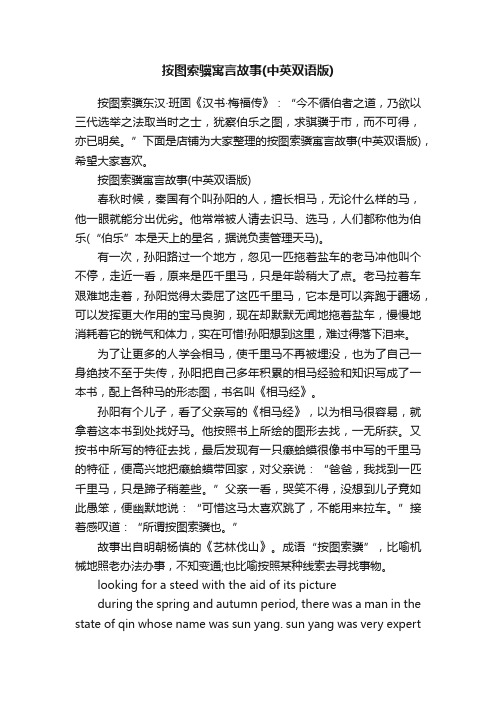
按图索骥寓言故事(中英双语版)按图索骥东汉·班固《汉书·梅福传》:“今不循伯者之道,乃欲以三代选举之法取当时之士,犹察伯乐之图,求骐骥于市,而不可得,亦已明矣。
”下面是店铺为大家整理的按图索骥寓言故事(中英双语版),希望大家喜欢。
按图索骥寓言故事(中英双语版)春秋时候,秦国有个叫孙阳的人,擅长相马,无论什么样的马,他一眼就能分出优劣。
他常常被人请去识马、选马,人们都称他为伯乐(“伯乐”本是天上的星名,据说负责管理天马)。
有一次,孙阳路过一个地方,忽见一匹拖着盐车的老马冲他叫个不停,走近一看,原来是匹千里马,只是年龄稍大了点。
老马拉着车艰难地走着,孙阳觉得太委屈了这匹千里马,它本是可以奔跑于疆场,可以发挥更大作用的宝马良驹,现在却默默无闻地拖着盐车,慢慢地消耗着它的锐气和体力,实在可惜!孙阳想到这里,难过得落下泪来。
为了让更多的人学会相马,使千里马不再被埋没,也为了自己一身绝技不至于失传,孙阳把自己多年积累的相马经验和知识写成了一本书,配上各种马的形态图,书名叫《相马经》。
孙阳有个儿子,看了父亲写的《相马经》,以为相马很容易,就拿着这本书到处找好马。
他按照书上所绘的图形去找,一无所获。
又按书中所写的特征去找,最后发现有一只癞蛤蟆很像书中写的千里马的特征,便高兴地把癞蛤蟆带回家,对父亲说:“爸爸,我找到一匹千里马,只是蹄子稍差些。
”父亲一看,哭笑不得,没想到儿子竟如此愚笨,便幽默地说:“可惜这马太喜欢跳了,不能用来拉车。
”接着感叹道:“所谓按图索骥也。
”故事出自明朝杨慎的《艺林伐山》。
成语“按图索骥”,比喻机械地照老办法办事,不知变通;也比喻按照某种线索去寻找事物。
looking for a steed with the aid of its pictureduring the spring and autumn period, there was a man in the state of qin whose name was sun yang. sun yang was very expertin looking at horses and judging their worth. whatever the horse might be, he could tell whether it was good or bad at first sight. people called him bo le (bo le was the name of one of the celestial bodies and was fabled to be in charge of heavenly steeds), and he was often asked to appraise and select horses.one day, when sun yang was passing a place, an old horse pulling acart loaded with salt suddenly neighed to him without stopping. he came near, and saw that it was a horse that really could cover a thousand li a day, and that the only problem with it was that it was a little too old. the old horse was pulling the heavy cart with difficulties and hardships. sun yang felt acutely that the horse was really unjustly treated, for it might have been a fine steed galloping on the battlefield. it was a great pity that it was pulling the cart loaded with salt without attracting public attention, which had taken the edge off its spirit and consumed its energy. when he thought of this, he was so grieved that he shed tears.in order to help more people learn how to appraise horses so that fine horses which could cover a thousand li a day would no longer fall into oblivion, and also in order to ensure that his unique skill in judging horses would not be lost, sun yang worte a book entitled the art of looking at horses and judging their worth, based on his experiences and knowledge accumulated over the years. the book was also illustrated with the pictures of various horses.sun yang had a son who, after reading his father's the art of looking at horses and judging their worth, thought it was very esay to appraise horses. so he took the book with him to look for fine horses everywhere. at first he searched according to the pictures in the book, and accomplished nothing. then hesearched according to the characteristics of a toad fit very well the characteristics described in the book. so he happily took the toad back home, and said to his father, "father, i have found a horse that can cover a thousand li a day, only its hoofs are not good enough." looking at the toad, sun yang did not know whether he should laugh or cry. knowing that his son was stupid, sun yang said humourously. "it's a pity that this horse is too fond of jumping to pull a cart." then he sighed, "that is just what we call looking for a steed with the aid of its picture."later, people have used the set phrase "look for a steed with the aid of its picture" to refer to handling affairs mechanically in the outmoded ways without being flexible. somethimes it is also used to refer to trying to locate something by following up a clue. this set phrase originates in lumbering in the forest of art written by yang shen in the ming dynasty (1368-1644).。
寓言故事中英文版--愚公移山
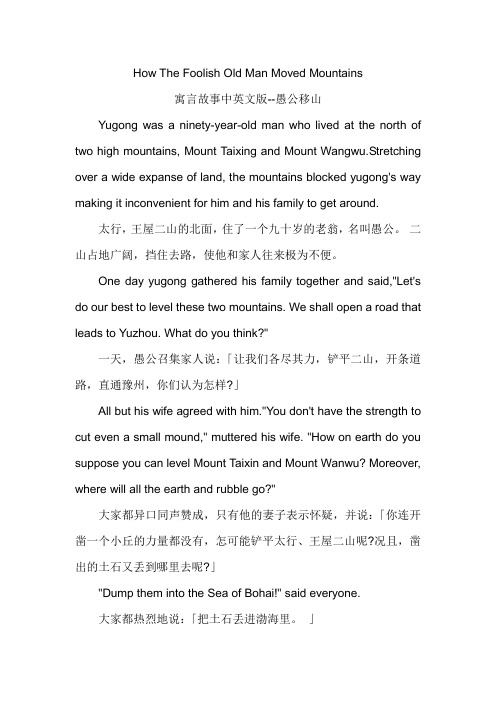
How The Foolish Old Man Moved Mountains寓言故事中英文版--愚公移山Yugong was a ninety-year-old man who lived at the north of two high mountains, Mount Taixing and Mount Wangwu.Stretching over a wide expanse of land, the mountains blocked yugong's way making it inconvenient for him and his family to get around.太行,王屋二山的北面,住了一个九十岁的老翁,名叫愚公。
二山占地广阔,挡住去路,使他和家人往来极为不便。
One day yugong gathered his family together and said,"Let's do our best to level these two mountains. We shall open a road that leads to Yuzhou. What do you think?"一天,愚公召集家人说:「让我们各尽其力,铲平二山,开条道路,直通豫州,你们认为怎样?」All but his wife agreed with him."You don't have the strength to cut even a small mound," muttered his wife. "How on earth do you suppose you can level Mount Taixin and Mount Wanwu? Moreover, where will all the earth and rubble go?"大家都异口同声赞成,只有他的妻子表示怀疑,并说:「你连开凿一个小丘的力量都没有,怎可能铲平太行、王屋二山呢?况且,凿出的土石又丢到哪里去呢?」"Dump them into the Sea of Bohai!" said everyone.大家都热烈地说:「把土石丢进渤海里。
中国寓言文言文及翻译

昔者,有鹬有蚌,皆居于海滨。
鹬性好啄蚌,蚌欲避之,乃紧闭其壳。
鹬久不得啄,怒曰:“吾欲啄汝,汝反闭壳,岂非以吾为鱼肉乎?”蚌答曰:“吾固知汝欲啄吾,故闭壳以防害。
然吾虽闭壳,汝终不能得啄吾也。
汝若开壳,吾即闭壳,汝岂能常啄吾哉?”鹬闻言,默然良久,思所以解蚌壳之计。
蚌亦料鹬无他法,故不急于开壳。
适有渔翁经过,见鹬蚌相持,遂上前曰:“吾闻鹬蚌相争,渔翁得利。
汝等何不罢斗,听吾一言?”鹬蚌相顾,俱有罢斗之意。
渔翁曰:“鹬虽欲啄蚌,然蚌壳坚不可破。
蚌虽欲闭壳,然鹬口亦难以啄入。
不如各退一步,鹬得啄蚌之乐,蚌得避啄之安。
渔翁亦可得其所愿,岂不两全其美?”鹬蚌闻言,俱以为然。
于是,鹬释蚌,蚌开壳,各得其所。
渔翁见鹬蚌和好,遂携之而去,得其所利。
后之君子闻之,皆以鹬蚌为鉴,知利不可争,争则两伤。
故当知进退之机,避争斗之害,以求共存之道。
译文:从前,有一只鹬和一只蚌,它们都生活在海边。
鹬喜欢啄食蚌,而蚌为了躲避鹬的啄食,就紧紧地关闭自己的壳。
鹬长时间不能啄食到蚌,愤怒地说:“我想要啄食你,你却紧紧地关闭壳,难道不是把我当作鱼肉吗?”蚌回答说:“我当然知道你想啄食我,所以我才关闭壳来防备你的伤害。
但是,我虽然关闭了壳,你终究也不能啄食到我。
如果你打开壳,我就再关闭,你难道能一直啄食到我吗?”鹬听后,沉默了很长时间,思考着如何解开蚌壳的计策。
蚌也料定鹬没有其他办法,所以不急于打开壳。
恰巧有一个渔翁经过,看到鹬和蚌在争斗,便上前说:“我听说鹬和蚌争斗,渔翁得到好处。
你们为什么不停止争斗,听我一言?”鹬和蚌相互看了看,都有停止争斗的意愿。
渔翁说:“鹬虽然想啄食蚌,但是蚌的壳坚硬无法破坏。
蚌虽然想关闭壳,但是鹬的嘴也难以啄入。
不如各退一步,鹬可以得到啄食蚌的快乐,蚌可以得到避免被啄食的安全。
渔翁也可以得到他所希望的好处,这不就是两全其美吗?”鹬和蚌听后,都认为很有道理。
于是,鹬放开了蚌,蚌打开了壳,各自得到了满足。
渔翁看到鹬和蚌和解了,就带着它们离开了,得到了他所希望的利益。
中国古代寓言故事英文版
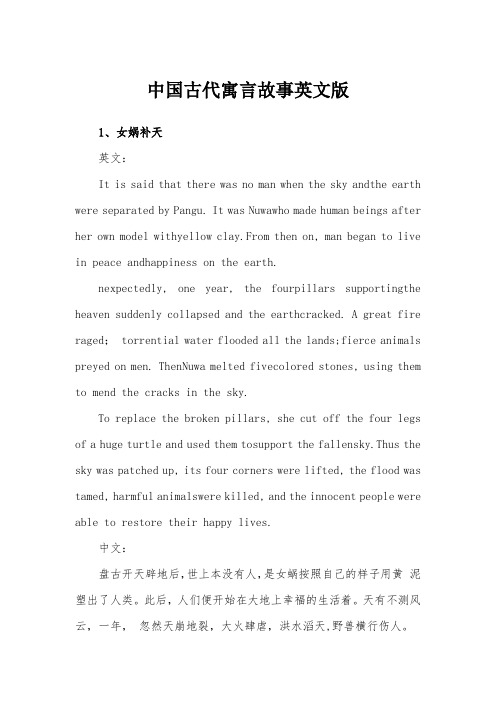
中国古代寓言故事英文版1、女娲补天英文:It is said that there was no man when the sky andthe earth were separated by Pangu. It was Nuwawho made human beings after her own model withyellow clay.From then on, man began to live in peace andhappiness on the earth.nexpectedly, one year, the fourpillars supportingthe heaven suddenly collapsed and the earthcracked. A great fire raged; torrential water flooded all the lands;fierce animals preyed on men. ThenNuwa melted fivecolored stones, using them to mend the cracks in the sky.To replace the broken pillars, she cut off the four legs of a huge turtle and used them tosupport the fallensky.Thus the sky was patched up, its four corners were lifted, the flood was tamed, harmful animalswere killed, and the innocent people were able to restore their happy lives.中文:盘古开天辟地后,世上本没有人,是女蜗按照自己的样子用黄泥塑出了人类。
【双语阅读】中国寓言故事双语版(二)
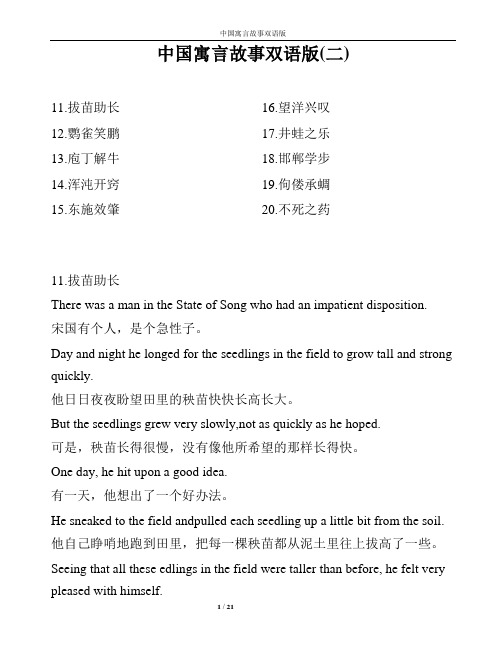
中国寓言故事双语版(二)11.拔苗助长12.鹦雀笑鹏13.庖丁解牛14.浑沌开窍15.东施效肇16.望洋兴叹17.井蛙之乐18.邯郸学步19.佝偻承蜩20.不死之药11.拔苗助长There was a man in the State of Song who had an impatient disposition.宋国有个人,是个急性子。
Day and night he longed for the seedlings in the field to grow tall and strong quickly.他日日夜夜盼望田里的秧苗快快长高长大。
But the seedlings grew very slowly,not as quickly as he hoped.可是,秧苗长得很慢,没有像他所希望的那样长得快。
One day, he hit upon a good idea.有一天,他想出了一个好办法。
He sneaked to the field andpulled each seedling up a little bit from the soil. 他自己睁哨地跑到田里,把每一棵秧苗都从泥土里往上拔高了一些。
Seeing that all these edlings in the field were taller than before, he felt very pleased with himself.看到田里的秧苗都比原来高了,他心里感到乐滋滋的。
He went home. Though all worn out, he told the members of his family happily:回到家里,他虽然筋疲力尽,但是非常高兴地告诉家人说:"I worked for a whole day today.“今天,我干了一整天。
How tired I am! But the seedlings in the field have grown a lot taller."好累啊!不过,田里的秧苗倒是长高好多了。
中国寓言小故事文言文及翻译

中国寓言小故事文言文及翻译1、刻舟求剑原文:楚(周代国名,都城在今湖北江陵县北)人有涉江者,其剑自舟中坠于水,遽契(jù qì)其舟,曰:“是吾(wú)剑之所从坠。
”舟止,从其所契者入水求之。
舟已行矣(yǐ),而剑不行,求剑若此,不亦惑乎!————节选自《吕氏春秋·察今》译文:楚国有个渡江的人,他的剑从船里掉入水中,他急忙在剑掉下去的地方刻了个记号,说:“这儿是我的剑掉下去的地方。
”船停下来后,他便从自己刻记号的地方下水去寻找剑。
船已经向前走了,而剑没有,像这样找剑,岂不是太糊涂了吗?2、自相矛盾原文:楚人有鬻盾与矛者,誉之曰:“吾盾之坚,物莫能陷也。
”又誉其矛曰:“吾矛之利,于物无不陷也。
”或曰:“以子之矛陷于之盾,何如?”其人弗能应也。
夫不可陷之盾与无不陷之矛,不可同世而立。
译文:楚国有个卖矛和盾的人,夸他的盾说:“我的盾很坚固,任何武器都刺不破它。
”又夸他的矛说:“我的矛很锐利,没有东西穿不透的。
”有人质问他:“拿你的矛去刺你的盾,结果会怎样?”那人便答不上话来了。
本来,坚不可破的盾和无坚不穿的矛是不可能同时并存的。
3、郑人买履原文:郑人有欲买履者,先自度其足,而置之其坐,至之市而忘操之。
已得履,乃曰:“吾忘持其度。
”反归取之。
及反,市罢,遂不得履。
人曰:“何不试之以足?” 曰:“宁信度,无自信也。
”译文:有个想要买鞋子的郑国人,他先在家里量了自己的脚,把尺码放在了他的座位上。
到了前往集市的时候,却忘了带量好的尺码。
他已经拿到鞋子,(才发现自己忘了带尺寸了)就说:“我忘记带尺码了。
”返回家去取尺寸。
等到他赶回来,集市已经散了,最终没有买到鞋。
有人问他说:“你为什么不用自己的脚试一试鞋子的大小呢?”他回答说:“我宁可相信尺码,也不相信自己的脚!”4、买椟还珠原文:楚人有卖其珠于郑者,为木兰之柜,薰以桂.椒,缀以珠玉,饰以玫瑰,辑以翡羽。
郑人买其椟而还其珠。
中国经典寓言故事英文版
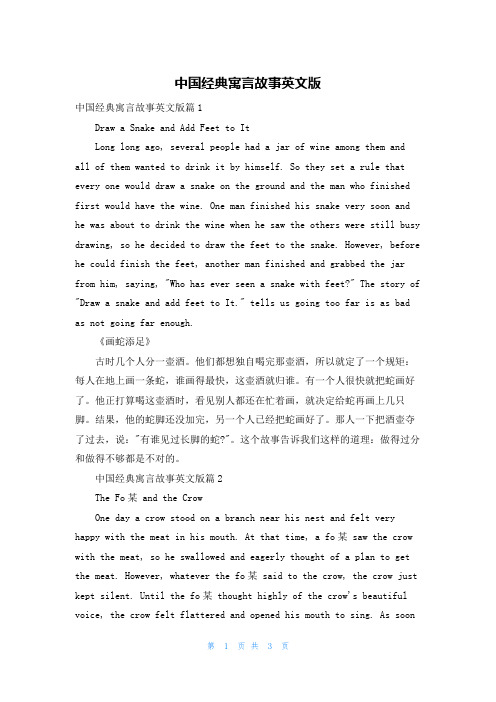
中国经典寓言故事英文版中国经典寓言故事英文版篇1Draw a Snake and Add Feet to ItLong long ago, several people had a jar of wine among them andall of them wanted to drink it by himself. So they set a rule that every one would draw a snake on the ground and the man who finished first would have the wine. One man finished his snake very soon and he was about to drink the wine when he saw the others were still busy drawing, so he decided to draw the feet to the snake. However, before he could finish the feet, another man finished and grabbed the jar from him, saying, "Who has ever seen a snake with feet?" The story of "Draw a snake and add feet to It." tells us going too far is as bad as not going far enough.《画蛇添足》古时几个人分一壶酒。
他们都想独自喝完那壶酒,所以就定了一个规矩:每人在地上画一条蛇,谁画得最快,这壶酒就归谁。
有一个人很快就把蛇画好了。
他正打算喝这壶酒时,看见别人都还在忙着画,就决定给蛇再画上几只脚。
古代寓言故事精品(文白对译)
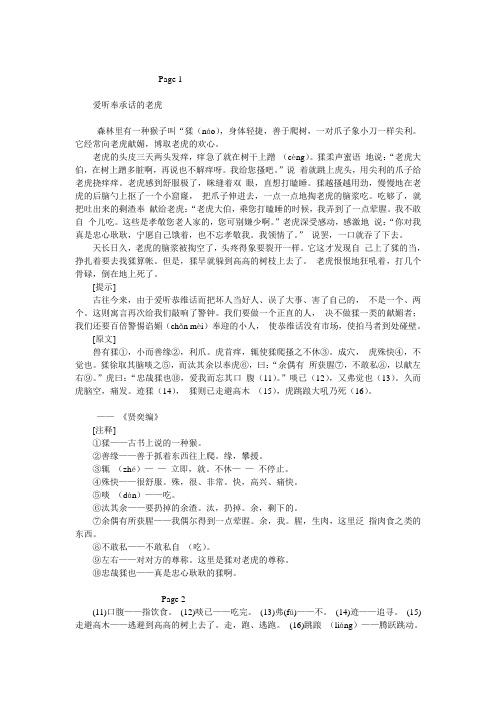
---------------------- Page 1-----------------------爱听奉承话的老虎森林里有一种猴子叫“猱(náo),身体轻捷,善于爬树,一对爪子象小刀一样尖利。
它经常向老虎献媚,博取老虎的欢心。
老虎的头皮三天两头发痒,痒急了就在树干上蹭(câng)。
猱柔声蜜语地说:“老虎大伯,在树上蹭多脏啊,再说也不解痒呀。
我给您搔吧。
”说着就跳上虎头,用尖利的爪子给老虎挠痒痒。
老虎感到舒服极了,眯缝着双眼,直想打瞌睡。
猱越搔越用劲,慢慢地在老虎的后脑勺上抠了一个小窟窿,把爪子伸进去,一点一点地掏老虎的脑浆吃。
吃够了,就把吐出来的剩渣奉献给老虎:“老虎大伯,乘您打瞌睡的时候,我弄到了一点荤腥。
我不敢自个儿吃。
这些是孝敬您老人家的,您可别嫌少啊。
”老虎深受感动,感激地说:“你对我真是忠心耿耿,宁愿自己饿着,也不忘孝敬我。
我领情了。
”说罢,一口就吞了下去。
天长日久,老虎的脑浆被掏空了,头疼得象要裂开一样。
它这才发现自己上了猱的当,挣扎着要去找猱算帐。
但是,猱早就躲到高高的树枝上去了。
老虎恨恨地狂吼着,打几个骨碌,倒在地上死了。
[提示]古往今来,由于爱听恭维话而把坏人当好人、误了大事、害了自己的,不是一个、两个。
这则寓言再次给我们敲响了警钟。
我们要做一个正直的人,决不做猱一类的献媚者;我们还要百倍警惕谄媚(chǎn mâi)奉迎的小人,使恭维话没有市场,使拍马者到处碰壁。
[原文]兽有猱①,小而善缘②,利爪。
虎首痒,辄使猱爬搔之不休③。
成穴,虎殊快④,不觉也。
猱徐取其脑啖之⑤,而汰其余以奉虎⑥,曰:“余偶有所获腥⑦,不敢私⑧,以献左右⑨。
”虎曰:“忠哉猱也⑩,爱我而忘其口腹(11)。
”啖已(12),又弗觉也(13)。
久而虎脑空,痛发。
迹猱(14),猱则已走避高木(15),虎跳踉大吼乃死(16)。
——《贤奕编》[注释]①猱——古书上说的一种猴。
②善缘——善于抓着东西往上爬。
寓言故事-杀猪教子英文版(中英对照)

杀猪教子曾子是孔子的一个学生。
有一天,曾子的妻子要上街。
儿子吵着要跟妈妈一起去,又哭又闹,吵个不停。
妻子没有办法,只好弯腰哄他,说:“我的小宝贝,回家去吧!妈妈去了就回来,一回来就杀猪给你吃。
”儿子听了,高高兴兴地回家去了。
过了不久,妻子从街上回到了家。
曾子就把家里的肥猪捆住,拿出雪亮的尖刀,准备杀猪。
妻子看见了就急忙拉住曾子的手,说:“你这是怎么了?我只不过是哄哄小孩的。
”曾子严肃地说:“你怎么能够哄骗孩子呢?现在,孩子还小,不懂事,他只会照着父母的样子去做。
你现在哄骗孩子,孩子就会学你的样子,去哄骗别人。
做母亲的哄骗儿子,做儿子的就不会再信任母亲。
这样,怎么能教育好孩子呢?”曾子话一说完,就一刀宰了肥猪。
Killing the Pig to Educate the SonZeng Zi was one of Confucius’ disciples.0ne day, Zeng Zi’s wife wanted to go to market. Their son wanted go together with her. He made a row, crying and fussing without stop. His wife could do nothing but bend down to humour him, saying:“My darIing, go home now. Mama will be back soon. When I'm back, I'll killing the pig to make a meal for you.”When the son heard this, he went home happily.Not long after, the wife returned home from the market. Zeng Zi tied up their fat pig, took out a shining sharp knife and prepared to kill it. When his wife saw this, she hurriedly held Zeng Zi by the hand and said:“What's the matter with you? I was only trying to humour the child.”Zeng Zi said seriously:“How can you cheat a child? The child is still small and doesn't understand things. He only follows the example of his parents. Now you cheat him, then he will follow your example and cheat others. Furthermore, when a mother cheats her child, the child will no longer trust his mother. Then, how can you educate the child well?” Having said this, Zeng Zi raised his knife and killed the fat pig.。
中国经典寓言故事(双语)

中国经典寓言故事(双语)中国经典寓言故事(双语)寓言故事是文学体裁的一种,含有讽喻或明显教训意义的故事。
那么中国的经典寓言故事,大家知道哪些?下面就是小编收集的几篇,还是双语的,欢迎大家阅读!中国经典寓言故事:刻舟求剑One day, a man of the State of Chu was crossing a river by boat. Due to carelessness, his sword which hung at his side fell into the water. Not in the least worried, he slowly took out a small knife and cut a mark on the side of the boat.一天,有个楚国人坐船过河,一不小心身上挂的宝剑掉进河坚去了。
他一点儿也不着急,慢腾腾地拿出小刀,在船舷上刻了一个记号。
Someone on the boat asked him:有人问他:"Why don't you jump into the water at once to fish for your sword? What's the use of making this mark on the side of the boat?"“为什么不赶快下水把它捞起来?你在船舷上刻这个记号有什么用啊?”He pointed to the mark on the side of the boat, saying unhurriedly:他指着船舷上的记号,不慌不忙地说:"There is no need to worry. My sword fell into the river at this marked place. As soon as the boat reaches the dock and pulls in to shore, I will jump down from here to retrieve my sword."“不用着急。
中国寓言故事英语翻译

中国寓言故事英语翻译平时有时间的话可以多多看看英语的小故事,提升一下英语的水平,下面小编就给大家整理了英语小故事,有时间快点阅读一下吧英语小故事一One year in the Eastern Han Dynasty, there was a serious famine in I-Jenan.东汉时的某一年,河南一带,饥荒严重。
One night, a thief sneaked into Chen Shi's house and hid himself on the beam. When Chen Shi was aware of this, he got out of bed without haste, called his children and grandchildren to his room and said in a stern voice:一天夜里,一个小偷潜人陈宴家,躲藏在屋子的横梁上。
陈宴觉察到后,不慌不忙地起了床,把儿女子孙们都叫到屋里,严厉地说: "One must always restrain and encourage oneself no matter under what circumstances. Bad men were not born bad. It is only become they don't restrain themselves that they develop bad habits and turn bad gradually. That gentleman on the beam is just a case in point."“一个人无论在什么情况下,都要克制自己,勉励自己。
坏人,不是天生就坏,而是因为平时不克制自己而养成了坏的习惯,才慢慢地变坏的。
那位梁上君子就是这样。
”Much ashamed upon hearing this, the thief hiding on the beam promptly jumped down to the ground, kowtowed and begged for forgiveness.躲在梁上的小偷听了,很惭愧,连忙翻身落地,磕头求饶。
- 1、下载文档前请自行甄别文档内容的完整性,平台不提供额外的编辑、内容补充、找答案等附加服务。
- 2、"仅部分预览"的文档,不可在线预览部分如存在完整性等问题,可反馈申请退款(可完整预览的文档不适用该条件!)。
- 3、如文档侵犯您的权益,请联系客服反馈,我们会尽快为您处理(人工客服工作时间:9:00-18:30)。
中国寓言故事中英对照中国寓言故事:The Emperor of Heaven Bestows Wine天帝赐酒One day, deities from various places came to pay homage to the Emperor of Heaven.一天,各路神仙都来朝拜天帝。
The emperor gave his minister in charge of wine cups the following order:天帝命令司筋大臣说:"Register the names of the deities first, then bestow wine upon them."“先把他们的名字登记好,再赐给他们酒喝。
”The minister registered the names of the deities on bamboo slips, and prepared to bestow wine. But he kept on working for 3, 000 years and had not finished the registration yet.司筋大臣拿着竹简,登记各路神仙的姓名,准备赐酒,可是登记了三千年,还没登记完。
The emperor inquired:天帝查问:"Why haven't you finished registering?"“你为什么还没有登记完?"The minister reported:司筋大臣报告说:"All the deities have brought their sedan-chair carriers."“各路神仙都带着轿夫。
”The emperor ordered:天帝下令:"Then register the sedan-chair carriers as well."“轿夫,也登记上吧!”7, 000 years passed and the registration was still not done.结果,又登记了七千年,还是没有登记完。
When the emperor inquired again, the minister had no way out but reported:当天帝再次查问的时候,司筋大臣无可奈何地报告说:"The sedan-chair carriers of the deities have brought their own carriers too."“各路神仙的轿夫,又都带着自己的轿夫啊!”So the wine was not bestowed after all.赐酒一事,最终还是没有成功。
The Emperor of Heaven remained silent for a long time and then heaved a deep sigh.天帝沉默了半天,长长地叹息了一声。
中国寓言故事:"Presenting Tall Hats"“戴高帽子"The Chinese people call flattery to someone's face "presenting a tall hat" to someone.中国人把当面说奉承话叫做给某人“戴高帽子”。
In the past, an official in the imperial court in Beijing was appointed to an official post outside the capital. Before departure, he went to histeacher's home to bid farewell. His teacher warned him:在古代,有一个在京城朝廷里做官的人,奉命去外地做官。
临行前,他去老师家告别。
老师叮嘱说:"It is not easy to be an official outside the capital. You should be prudent and careful."“外地的官不容易做,应当谨慎小心些才好。
”The official replied:那个做官的人回答说:"Please don't worry. I have prepared 100 `tall hats',and will present one to each and every person I meet. I'm sure all the local people will be pleased."“请老师放心,我准备了一百顶高帽子,逢人便送他一顶,管叫地方上人人高兴。
”The teacher said reproachingly:老师生气地说:"We are all honest gentlemen. How can you do that?"“我们都是正人君子,怎么可以这样做呢?”The official pretended he had no way out and said:那个做官的人装着无可奈何的样子说:"Very few people under heaven are like you who dislike being flattered or presented with tall hats."“天下不喜欢戴高帽子的人实在太少了啊!像老师您这样的又能有几个呢!”Hearing this, the teacher was very much pleased. He nodded and said:老师听了很高兴,点点头说:"What you said is true, too."“你讲的也不错!”After the official said farewell to his teacher and went out, he said to his friend:那个做官的人告别老师出来后,对朋友说:"Of my 100 `tall hats',now only 99 are left."“我的一百顶高帽子,现在只剩下九十九顶了!”中国寓言故事:Prudent Reserve Between Men and Women男女有别A man named Fu Xian was fond of reading books. Though proficient in literature and etiquette, he was stubbornly adherent to outworn rules. Being impractical and dull, he looked just like an old pedant.有个叫傅显的人喜欢读书。
他对文章礼仪也很精通,只是性情迁腐迟钝,看上去就像个老学究。
One day, Fu Xian strolled on the street with measured strides and asked whomever he met:一天,傅显踱着四方步上街,见人就问:"Have you seen Wei San?"“看见魏三了吗?”Someone pointed to the direction and he walked on unhurriedly with measured strides. When he saw Wei San, he panted for a while, then said:有人给他指点方向,他就踱着方步走去。
等见到魏三,他喘了几口气之后才说:"I just saw your wife doing needlework under a tree. She was tired and taking a nap. Your child was playing beside a well, only 3 to 5 chi away from it. It seemed to me that some accident might happen. As there is prudent reserve between men and women, it was not convenient for me to awaken your wife in person. That's why I have come all the way here to tell you."“我刚才看见三嫂,她在树下做针线活儿,疲倦了,就在那儿打吨。
您家的小孩儿,在水井旁边玩耍,离井口不过三五尺远,看上去好像要出事。
因为男女有别,不便直接叫醒三嫂,所以特地跑来告诉你。
”Upon hearing this, Wei San was panic-stricken and hurried home. When he got home, his wife was bending over the well, wailing bitterly for their son.魏三听了,惊恐万分,急忙跑回家去。
等他赶到家,他的妻子已经趴在井口,在痛哭自己的儿子了!感谢您的阅读,祝您生活愉快。
